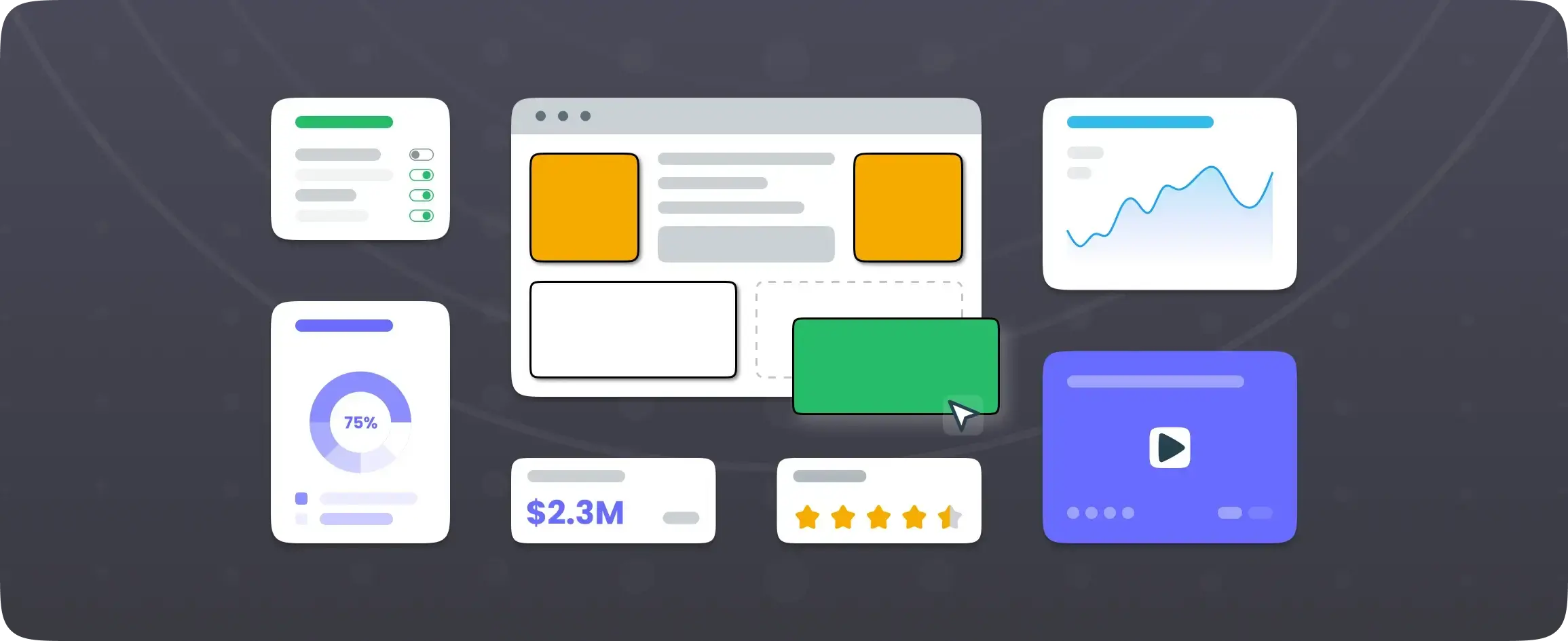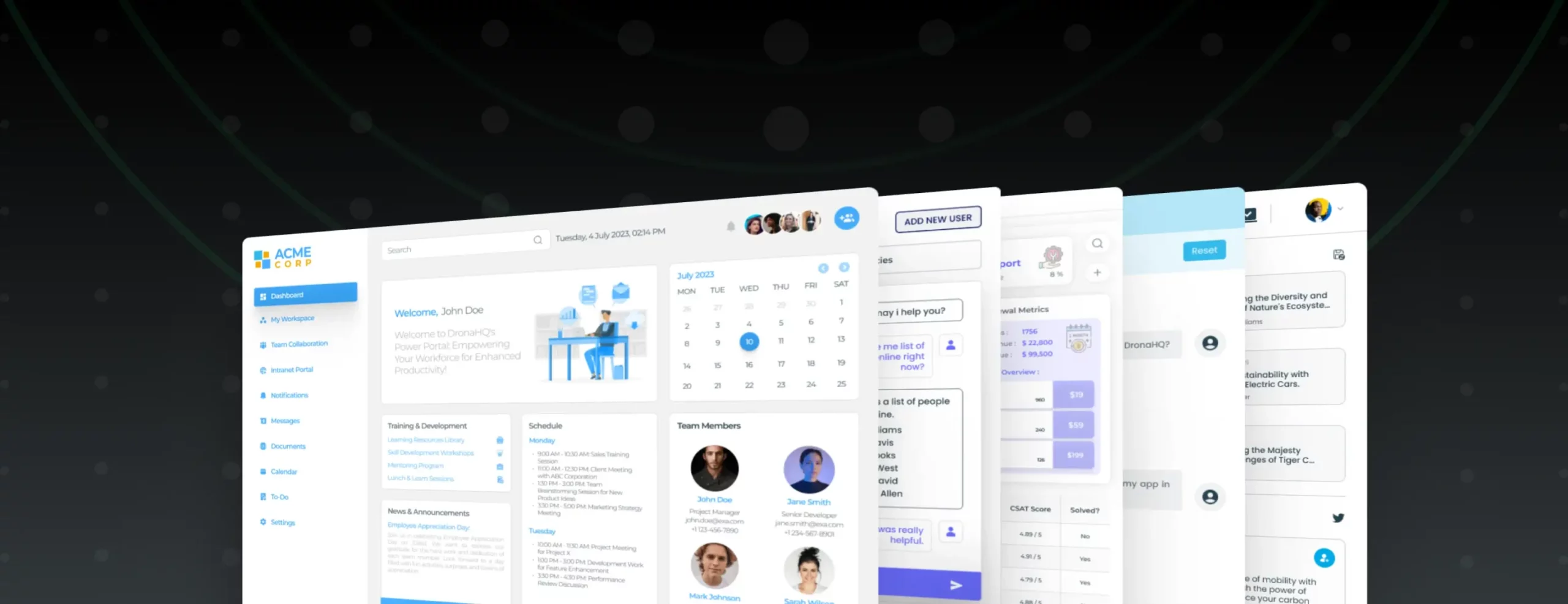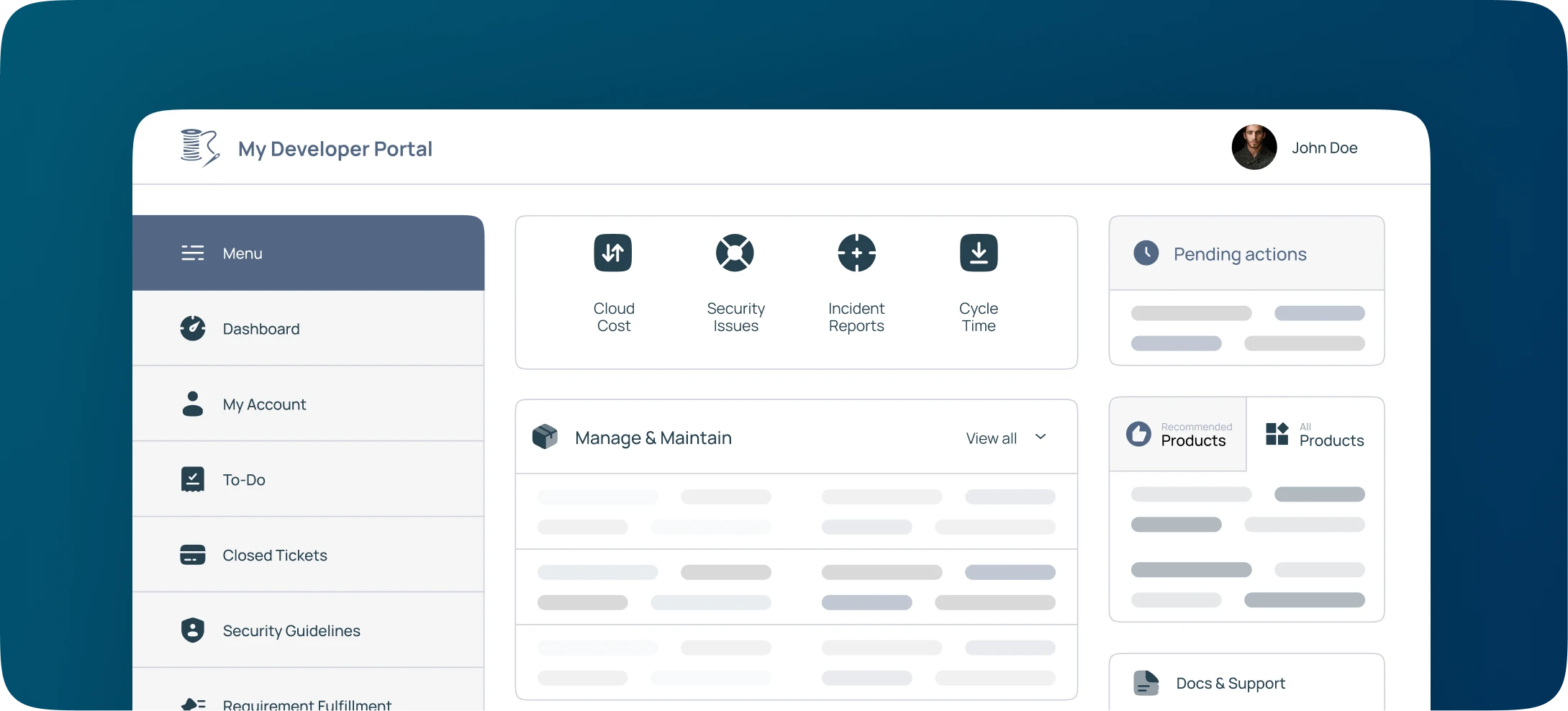

Low-code in 2025: What’s working and why
In today’s fast-paced digital landscape, businesses are under immense pressure to innovate and deliver solutions quickly. This is where low-code platforms come into play, transforming how organizations approach software development for operational tools, workflows, and internal tools.
Imagine a development environment where your team can build applications at lightning speed, yet maintain high standards of security, integration, and usability. Low-code platforms provide this by offering a comprehensive suite of tools designed to streamline and accelerate the development process.
By 2025, approximately 70% of new applications created by enterprises are expected to utilize low-code or no-code technologies, a significant increase from the less than 25% recorded in 2020.
Adopting a low-code platform correctly in your organization provides paved roads and operational necessities for developers, ensuring they can work at their preferred abstraction level. This includes easy connectors to APIs and databases, pre-built UI components, a visual workflow builder, robust security modules, role-based access control (RBAC), multiple environments, and version control.
These features collectively reduce the cognitive load on developers, allowing them to focus on innovation and quality. Consequently, your organization can deliver self-service apps, internal tools, operational tools, and other applications swiftly and efficiently, sustaining high-quality standards and meeting business needs at unprecedented speeds.
Let’s delve deeper into how a low-code platform can revolutionize the development process and empower your team to achieve more with less effort.
What is low-code?
Low-code is an efficient approach to application development that minimizes the need for extensive manual coding. Using visual interfaces and pre-built modules, developers can quickly build and deploy applications, making the development process faster and more accessible.
Imagine assembling a piece of furniture using pre-cut parts instead of starting from raw wood. Similarly, low-code allows you to focus on fitting components together rather than creating each element from scratch. The best: It accelerates app development by 10x.
Simply put, low-code development is a smart way for technology leaders like engineering heads, senior developers, CTOs, or CIOs to develop small to complex enterprise-grade apps and a better alternative to traditional development. Empowering developers to build trivial apps, rudimentary tasks, automation, workflows, and portals with low-code tools; thus helping them focus on impact engineering projects.
Low-code platforms help engineering leaders to stop misusing some of their most expensive and talented resources for trivial apps and internal tools.
While speaking with TechRepublic Jeffrey Hammond, vice president and principal analyst serving application development leaders at Forrester, thinks “low-code has the potential to reshape development teams entirely”.
Why do tech executives need to implement low-code development in their organizations?
Getting low-code development implemented isn’t just a trend; it’s a strategic imperative. It helps reduce the cognitive load, developers can utilize pre-built components and visual interfaces, reducing the complexity of building applications from scratch. This allows them to focus on core functionality and innovation.
During one of the CXOtalkseries episodes, Isaac Sacolick who served as three-time CIO said
“I think low-code platforms are probably the most important technology tool that CIOs need to look at. We do not have enough staff and our staff who are strong at AppDev really need to focus on the customer-facing pieces that are going to move the needle.”
Engineering heads find their teams delivering faster results with reduced workload, developers discover newfound agility in their workflows, and CTOs witness accelerated digital transformation.
Low-code platforms often feature collaborative tools that allow multiple stakeholders to participate in the development process, fostering better communication and alignment across teams.
Standardized components and templates ensure consistent quality across applications, reducing the likelihood of bugs and errors.
These platforms enable business analysts and other non-developers to create simple applications, freeing up developers to work on more complex tasks, and thus empowering non-technical users as well.
Low-code vs No-code: Which one is right for you?
Low-code platforms are designed for developers who want to speed up their workflow without losing control over the coding process. Low-code platforms provide pre-built UI components, ready connections to APIs or databases, visual logic builder, user management, and much more for developers but still allow for custom coding when needed.
For example, a developer might use a low-code platform to build an operational workflow application, leveraging pre-built modules for standard functions while writing custom code for logical outputs.
No-code platforms, on the other hand, are geared toward business users with ready templates and minimal customizations. These platforms offer fully visual development environments, enabling anyone to build applications through simple configurations and templates.
For instance, a small business owner might use a no-code platform to create a custom form system by dragging and dropping elements without writing a single line of code.
| Key points | Low-code | No-code |
| Target users | Developers | Citizen developers |
| Customization | Allows custom coding | No coding required |
| Complexity | Handles complex apps | Best for simple apps |
| Flexibility | High | Moderate |
| Skill level needed | Technical expertise beneficial | No technical skills needed |
Key benefits of low-code app development
Building apps using traditional methods is already a lot of work. Switching to low-code might seem intimidating because it means changing from what we’re used to.
But here are some major benefits to investing in low-code app development:
- Faster time-to-market: 72% of users are creating apps with low-code platforms in under 3 months. Pre-built templates & UI components, and ready connectors help apps roll out faster.
- Reduced development cost: Low-code platforms enable companies to save $4.4 million over three years by significantly reducing development costs and increasing efficiency.
- Accelerated digital transformation: 66% believe that digital transformation is the primary driver behind low-code adoption.
- Build scalable solutions with greater flexibility: Savvy enterprises are particularly likely to value low-code for its flexibility, with 83% expressing this view. Businesses can effortlessly scale applications to meet growing business needs without extensive redevelopment.
- Quick to learn, faster adoption: 70% of low-code users with no prior experience mastered low-code platforms in one month or less.
- Maximum efficiency with reusability: Low-code platforms can potentially slash development time by 90% as the app functionalities can be reused across projects.
- Easy to maintain: Deploy and update apps quickly as business needs change, enabling instant adjustments.
Who can develop with low-code?
Low-code development platforms are designed to be accessible to both developers and business analysts alike.
Low code democratizes app development within engineering and business teams by providing intuitive, visual tools and pre-built components that require minimal coding expertise. This enables both developers and non-developers to collaborate effectively, rapidly build applications, and address business needs without extensive technical training.
Non-developers, such as business analysts or project managers, can leverage low-code to create functional prototypes or simple applications without needing extensive programming skills. 71% of organizations utilizing citizen development have accelerated application development by at least 50%, with 29% of companies experiencing a doubling or more in delivery time.
“Because low-code platforms focus on giving professional developers the ability to build applications more quickly while minimizing the need to hand-code, traditional development backlogs become less about features and tasks and more about applications — improving both the productivity and morale of the developers as well as the customer-centricity of the apps themselves.”
: says Jason Bloomberg, at Kintone Connect 2017.
| User role | Skills needed | Use cases | Examples |
| Developers | Coding knowledge | Complex Applications, Integrations | Automating Workflows, Enterprise Apps |
| Business Analysts | Analytical skills, Basic coding | Data Analysis, Reporting, Process Automation | Custom Dashboards, Automated Reports |
| Marketing Managers | Basic tech-savvy, No coding | Campaign Management, Customer Engagement | Custom CRM Solutions, Campaign Tracking |
| HR Managers | Basic tech-savvy, No coding | Employee Management, Recruitment Processes | Onboarding Apps, Performance Tracking |
| Finance Officers | Basic tech-savvy, No coding | Financial Reporting, Budgeting | Expense Tracking, Budget Approval Systems |
| Sales Managers | Basic tech-savvy, No coding | Sales Tracking, Customer Management | Sales Pipeline Management, Customer Portals |
| Operations Managers | Basic tech-savvy, No coding | Process Optimization, Resource Allocation | Inventory Management, Resource Planning |
| Customer Support Agents | Basic tech-savvy, No coding | Customer Service, Issue Tracking | Ticketing Systems, Knowledge Base Management |
| IT Administrators | Technical knowledge, Basic coding | System Management, Security | User Access Control, System Monitoring |
| Project Managers | Organizational skills, Basic tech-savvy | Project Tracking, Collaboration | Project Management Tools, Collaboration Platforms |
| Product Managers | Market analysis, Basic tech-savvy | Product Development, Roadmapping | Feature Request Tracking, Product Roadmaps |
| UX/UI Designers | Design skills, No coding | Prototyping, User Testing | Interactive Prototypes, Usability Testing Tools |
What can you build with a low-code platform?
Low-code development platforms empower users to create a wide range of applications across various industries and departments.
Example use cases for low-code platforms
- Internal Tools: Develop administrative dashboards, employee portals, and internal data management systems that can be rapidly customized and deployed.
- Operational Tools: Create workflow automation tools, reporting systems, and resource management applications to streamline business operations.
- Customer-Facing Applications: Build and iterate on customer portals, mobile apps, and web applications that require regular updates and new features.
- Prototyping and MVPs: Quickly develop prototypes and minimum viable products (MVPs) to test new ideas and gather user feedback.
The possibilities are endless, from internal tools to public apps, to marketing automation tools to customer support portals. It doesn’t matter if you’re in healthcare, retail, IT management, or manufacturing, low-code will help engineering teams build solutions to your requirements.
Some varied applications across industries; many more possibilities:
| Industry | Applications |
| Marketing | Marketing automation tools, CRM systems, Campaign trackers |
| Retail | Inventory management systems, E-commerce platforms, Loyalty apps |
| Healthcare | Electronic health records (EHR) systems, Telemedicine apps, Patient portals |
| IT Management | Project management tools, Helpdesk ticketing systems, Asset tracking apps |
| Customer Support | Self-service portals, Knowledge bases, Ticket management systems |
| Manufacturing | Production tracking systems, Quality control apps, Supply chain management tools |
Choosing the best low-code platform
Selecting the right low-code platform depends on your role and specific needs. Generally, CTOs or developers rely on particular feature sets before deciding to use a low-code platform. They can check out the platform, use the free trial, and even get a demo.
Each decision-maker has distinct priorities and can identify the best low-code platform for their needs. The chosen platform must appeal to and convince all stakeholders involved in the decision-making process.
Here are a few decision factors; role-wise.
CTO’s perspective:
- Scalability: Ability to handle increasing user loads and data volumes.
- Security measures: Robust data encryption, access controls, self-hosting, and compliance with industry standards.
- Multi-channel deployment: Ability to deploy applications across web, mobile, and desktop environments.
- Vendor support: Access to comprehensive support and training resources.
- Resource optimization: Maximize the efficiency of existing IT infrastructure.
- Collaborative platform: The platform should facilitate real-time business-IT collaboration.
Developer’s perspective:
- User-friendly interface: Intuitive drag-and-drop features for rapid development.
- Customization options: Flexibility to write custom code for specialized requirements.
- Pre-built templates: Ready-made templates to speed up the development process.
- Backend integration: Easy connection to databases and third-party APIs.
- Community support: Active user communities and extensive documentation for troubleshooting.
Implementing low-code platforms in your organization
To effectively integrate low-code platforms within your organization, consider the following steps:
- Identify suitable use cases: Determine the types of applications that would benefit most from a low-code approach. Common use cases include internal tools, operational tools, and customer-facing apps that require frequent updates and customization.
- Define clear goals and metrics: Establish clear objectives for what you want to achieve with low-code platforms, such as reducing development time, improving application quality, or enabling rapid prototyping. Use these goals to measure success.
- Select the right platform: Choose a low-code platform that aligns with your organization’s needs and technical stack. Consider factors such as ease of integration, scalability, security features, and user experience.
- Provide training and support: Ensure that your team is well-equipped to use the low-code platform by providing training and ongoing support. Encourage a culture of continuous learning and experimentation.
- Integrate with existing processes: Seamlessly integrate the low-code platform into your current development workflows. Ensure compatibility with your version control systems, CI/CD pipelines, and other development tools.
- Promote cross-functional collaboration: Foster collaboration between developers, business analysts, and other stakeholders. Utilize the platform’s collaborative features to gather feedback and iterate on application design.
Building your first low-code app with DronaHQ
DronaHQ is a low-code app development platform designed to create robust internal tools, admin panels, dashboards, customer portals, AI-enabled apps, public forms, and custom business applications.
It features a user-friendly drag-and-drop interface, pre-built UI controls, and a variety of ready connectors, enabling teams to build both web and mobile (iOS & Android) apps efficiently.
From Fortune 500 to startups, everyone uses DronaHQ the most efficient way to build business apps.
- Mondelez, a CPG giant developed 15+ apps and experienced a 90% faster development.
- Mattress brand ENDY Sleep adopts DronaHQ to transform customer success operations and accelerate query resolution.
- Online cosmetics retailer Purplle built personalization modules and marketing operational tools with sustainable custom apps.
- Pickleball manufacturer, Selkirk Sport, makes customer support workflows 66% faster.
Want to see DronaHQ live in action? Book a free demo with us today!







